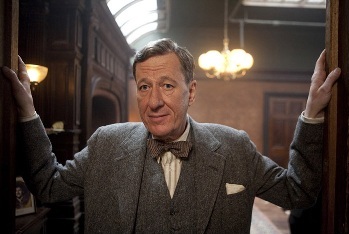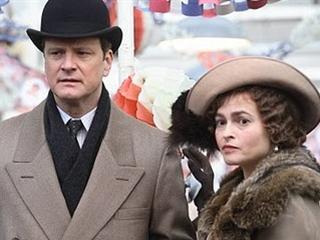The King’s Speech (2010, Dir. Tom Cooper):
It sounds like a fairy tale: the king of a besieged country suffers from a strange ailment that only a kindly wizard can cure. Will his highness recover in time to lead his country through its darkest days to eventual triumph? In the case of The King’s Speech, the fairy tale has the added bonus of being drawn from real life as it chronicles England’s King George VI (Colin Firth), as uneasy a head as has ever worn a crown. Cursed with a perpetual stammer and caught in the shadow of his feckless older brother Edward (Guy Pearce), George finds himself thrust onto the world stage as England teeters on the brink of World War II, and wouldn’t you know it, it all comes down to a live radio speech he must deliver to the folks of Britain on the day war is declared. Will he pull himself together to deliver the necessary stirring patriotism required to buck up the spirits of his people? It all depends on a commoner and rogue who happens to be named Logue (Geoffrey Rush), a doctor without a degree who also happens to be a miracle worker when it comes to speech impediments.
 It’s feathery, near-whimsical material, and The King’s Speech, as you would expect from the Weinstein brothers, who co-produced the film, approaches it in the canniest manner possible. Just in time for the holiday season, we get a tidy package tailor-made for Oscar adulation: drama that cuts just deep enough, a zesty clash between the upper and lower classes played for gentle (if not necessarily provocative) laughs, sumptuous period details, and a stately cast. Cue sweeping emotional uplift and a bushel of awards, as intended.
It’s feathery, near-whimsical material, and The King’s Speech, as you would expect from the Weinstein brothers, who co-produced the film, approaches it in the canniest manner possible. Just in time for the holiday season, we get a tidy package tailor-made for Oscar adulation: drama that cuts just deep enough, a zesty clash between the upper and lower classes played for gentle (if not necessarily provocative) laughs, sumptuous period details, and a stately cast. Cue sweeping emotional uplift and a bushel of awards, as intended.
Fortunately for us, The King’s Speech is refreshingly restrained in its attack. Genteel and light on its feet, the film prefers not to agonize overmuch about the king’s predicament — instead, it finds its rhythms with Rush’s Logue, a gregarious man with a yen for Shakespearean performance, and little patience with the niceties of aristocracy. Less a Pygmalion story than a low-key therapy session, Logue gets to the root of the king’s problems not with a dramatic Freudian explanation but with simple straight talk — you know, like friends do. It’s a bit anachronistic at times (When Logue says “It’s my turf and my rules,” it sounds like something out of a modern gangster epic) but the film is breezy enough to accommodate such notes, and when Logue encourages the king to break out of his, er, kingly mien by rolling around on the floor, letting loose with a stream of expletives and tongue-twisters, or addressing him as an equal, the movie becomes an unlikely variant on the feel-good sports movie, as we root for the protagonist to rise to the occasion.
While Rush’s pauper gets to be the hero, it’s the prince we empathize with — photographed continually with a wide-angle lens and often isolated in the lower corner of the frame, George VI (or Bertie, as his family and Logue insist on calling him) is one very tightly-wound man. Firth, an actor who has made a career out of emotional constipation, finds new colors to play with in his monochromatic palette: his better nature at war with his temper and his snobby upbringing, he allows glimpses of his humanity to leak out in spurts, like a malfunctioning spigot. He finds an unlikely but fitting partner in Helena Bonham Carter as his wife Elizabeth — too pert and arch to necessarily convince as royalty, she nonetheless has a grand time registering disapproval, amusement and even love in a single quizzical twist of the lip. By the time the final speech rolls around, we’re fully invested in the king’s well-being, and even the climactic moment is nicely downplayed — instead of triumphant symphonies and brass, the moment is underscored by a measured string movement, a processional that gains heft in its stateliness, its refusal to be anything more than it is.
 Lionel Logue: Do you know any jokes?
Lionel Logue: Do you know any jokes?
King George VI: …Timing isn’t my strong suit.
One thing you won’t find in this movie is surprise — you can anticipate the beats when they come. Naturally there’s a scene in which Bertie and Logue have a messy falling out, followed by a scene of rapprochement and breakthrough with the two men, and of course Elizabeth is the good woman behind every good man, right down to the supportive speech made when the husband is at his lowest ebb (it’s to Firth’s credit that his big-moment breakdown comes off as something earned). The film’s refusal to push matters also works to its detriment at times: the exigencies of British politics are glossed over with clunky explanatory dialogue (Winston Churchill (Timothy Spall) might as well be called “Basil Exposition”), and for all its tasteful direction, there isn’t much depth to the characters — Guy Pearce provides the film’s one dirty moment as randy Edward, cutting Bertie to shreds with a single mimicked stammer, and Michael Gambon makes for a witty, disgruntled King George V as Bertie’s father, but neither of them are granted the opportunity to strike many dramatic sparks with Firth. Strangely enough, the biggest frission comes when Bertie plays with his radiant daughter Elizabeth II (Freya Wilson) — we can’t help but flash back to Helen Mirren’s turn in The Queen and ponder how life in royalty sapped away all of Elizabeth’s youthful effervescence. Maybe the British affection for the ruling class prevents the film from lowering itself to soap-opera dramatics, but more conflict might have given the proceedings more juice. Nevertheless, as holiday-season Oscar bait goes, The King’s Speech acquits itself nicely — like a nice frosting of holiday snow, it lingers just long enough to leave a pleasant memory before melting away.

